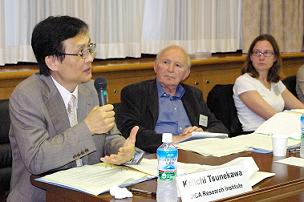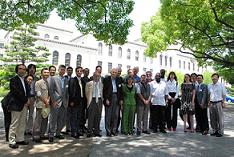Discussing Diversity and Economic Instability: A Diverse Group Gathers
2009.08.03

Dir. Tsunekawa, Prof. Ranis,
and Linda Van Gelder
On July 13 and 14, JICA-RI, in collaboration with Kobe University, held a two-day event to examine ethnic diversity and its relation to economic stability. The event, which was held at Kobe University, was comprised of a round-table paper presentation and discussion, and a public symposium.
The event, led by JICA-RI Special Fellow and Kobe University professor Hiroyuki Hino and Motoki Takahashi, also professor at Kobe University, and managed by JICA-RI's Senior Researcher, Takaaki Oiwa, was the first part of a four-part series of workshops for an on-going JICA-RI study entitled "Ethnic Diversity and Economic Instability in Africa: Policies for Harmonious Development." This study aims to gain a comprehensive understanding of the linkages between ethnic diversity and economic instability in Africa, as well as identify economic regimes and policies that diminish the impact of ethnically-diverse communities as an underlying cause of economic instability in Africa. The study also contributes to JICA-RI's commitment to growth and poverty reduction-one of its main research areas.
What made this event unique was that JICA-RI invited international experts in such fields as economics, social psychology, anthropology, history, and political science among others to bring their expertise and perspectives to the round-table, literally, in the form of research papers and presentation.
Among over twenty-five experts who attended were Gustav Ranis, the Frank Altschul Professor Emeritus of International Economics at Yale University, Frances Stewart, Professor of Development Economics of Oxford University, and Hiroyuki Hino, JICA-RI special fellow, Kobe University professor, and economic advisor to the Prime Minister of Kenya. Also in attendance were Linda van Gelder, Sector Manager for Poverty Reduction and Economic Management of the World Bank, and JICA-RI Director, Keiichi Tsunekawa.
The round-table discussions began with Professor Ranis presenting an extensive literature review on how ethnic diversity relates to income distribution, poverty, human development, and economic volatility. Professor Ranis formulated his hypotheses based on the geographic features of African countries such as access to waterways, abundance of natural resources, etc. This was followed by an economist's perspective by Professor Anjan Mukherji and Satish Jain of Jawaharlal Nehru University in India. They argued that a market economy and democracy are not ideal institutions in diverse ethnic societies like Africa, and that current economic policy assumptions should be reconsidered accordingly. Using a comparative example of tribes in West Africa (the Fulani) and East Africa (the Kikuyu and Luo), Cambridge University's Professor John Lonsdale gave an anthropological account of how Africa's colonial history influences Africa's socio-political thinking today as for relations between and within various ethnic groups. Professor Parker Shipton of Boston University described how restrictions in social migration in Africa are exacerbating land shortage, ecological problems, impoverishment, and violent conflict. He then recommended a deregulatory policy on social movement by developed countries. Several statistical models to capture ethnic diversity information including Ethno-Linguistic Fractionalization (ELF) were proposed and critiqued by Professor Graham Brown of Bath University. Finally, Professor Bruce Berman of Queen's University in Canada made a case of how historical colonialism molded ethnicity as we know it today, and how democratization is catalyzing ethnic conflict in Africa instead of dampening it.

Prof. Frances Stewert
On the event as whole and gathering of experts, Professor Ranis comments, "We collected some very good people-smart people-and it all adds up to give [a] final harmonious development program...." Professor Stewart, too, stresses the value of the event: "It's covering the important topic of ethnic diversity, instability, growth, and conflict, and it is also bringing together people of different countries and different disciplines. I think that is one of the important things." Of the other important things in the event, what is certain through consensus is that ethnic diversity, particularly in Africa, is inextricably linked to economic and political instability.
Over the next three years, the four-part study will continue with the following three sessions to be held at Yale University, Nairobi, Oxford University, and a final presentation of the findings in Tokyo in 2011. For the future of the project, Professor Stewart hopes "... [this study] will advance our knowledge, and that we can trace better the mechanisms whereby ethnic diversity leads to various outcomes, and from that I hope we can better identify policies."

JICA members with all attendees
The symposium portion of the event was open to the public with one hundred attendees, both students and professionals, and centered on the theme "Diversified World and the Global Economic Crisis: Challenges to Developing Countries and Roles of the International Community." JICA-RI's Professor Hino and the World Bank's Van Gelder kicked off the event with keynote speeches.
Dr. Van Gelder painted a bleak picture of the extent of the Crisis, particularly in East Asia, pointed out how the impact of the Crisis is different in mid-income countries and developing countries, and ended with the current efforts of the World Bank. Professor Hino argued that the export-led high growth strategy may not be the most beneficial move for African countries given the conditions of the current global economy among other reasons. He also prescribed two post-Crisis economic development models for Africa, one of which is based on Japan's own economic experiences.
Following the speeches, Professors Ranis, Stewart, and Director Tsunekawa offered their comments. Professor Ranis spoke on problems concerning economic stimulus policies, the risk of protectionism, the importance of ownership of developing countries and the increasing need for assistance in reaching the Millennium Development Goals (MDGs). Professor Stewart mentioned the diversity of impact of the Crisis, citing as examples how countries like China and India have been able to shield themselves from the Crisis, and how the effects of the Crisis are not felt at all in certain African areas. Director Tsunekawa informed the audience of JICA's strong commitment to assistance in Africa, specifically mentioning JICA's hastening of aid work in light of the Crisis, and shared an example of a current JICA infrastructure and state-building program in Africa.
*Papers will be published as JICA-RI's working papers in the near future.*
■ Agenda & Papers
"Click on name to view abstract"
July 13
9:00-9:10
Opening Remarks
Prof. Ryuzo Miyao, Director of RIEB, Kobe University
9:10-9:30
Introduction
Prof. Hiroyuki Hino, Kobe University/JICA Research Institute
Session 1
9:30-10:45
"Diversity of Communities and Economic Development: An Overview"
Chair:
Prof. Hiroyuki Hino, Kobe University/JICA Research Institute
Speaker:
Prof. Gustav Ranis.pdf
, Yale University
Comment:
Prof. Motoki Takahashi, Kobe University
Prof. Toru Yanagihara, Takushoku University
Discussion
Session 2
10:45-12:15
"Diversity of Preferences of Individuals, Interdependence
of Individual and Social Choice, and Stability of Market Economy"
Chair:
Prof. Nobuaki Hamaguchi, Kobe University
Speaker:
Prof. Anjan Mukherji.pdf
, Jawaharlal Nehru University
Prof. Satish Jain.pdf
, Jawaharlal Nehru University
Comment:
Prof. Ken-Ichi Shimomura, Kobe University
Prof. Michael Kremer, Harvard University
Discussion
12:15-13:30 Lunch
Session 3
13:30-14:45
"Construction of Ethnic Patriotisms in Africa: The Role of
Integration with Market Economy"
Chair:
Prof. Motoki Takahashi, Kobe University
Speaker:
Prof. John Lonsdale.pdf
, University of Cambridge
Comment:
Prof. Edward Oyugi, Kenyatta University
Prof. Frances Stewart, University of Oxford
Discussion
15:30-17:30
International Symposium "Diversified World and Global Economic
Crisis: Challenges to Developing Countries and Roles of the
International Community"
18:15-20:15 Reception
July 14
Session 4
9:30-10:45
"Ethnicity, Economy, and Mobility: A Preliminary Reflection on
Confinement and Violence -- South of the Sahara"
Chair:
Prof. Keiichi Tsunekawa, Director of JICA Research Institute
Speaker:
Prof. Parker Shipton.pdf
, Boston University
Comment:
Prof. Juro Teranishi, Nihon University
Prof. Jean Ensminger, California Institute of Technology
Discussion
Session 5
10:45-12:00
"Conceptualizing and Measuring Ethnicity"
Chair:
Prof. Ryuzo Miyao, Director of RIEB, Kobe University
Speaker:
Prof. Graham Brown.pdf
, University of Bath
Comment:
Prof. Nobuaki Hamaguchi, Kobe University
Mr. Takahiro Fukunishi, Institute of Developing Economies
Discussion
12:00-13:30 Lunch
Session 6
13:30-14:45
"Ethnicity and Democracy in Africa"
Chair:
Prof. Motoki Takahashi, Kobe University
Speaker:
Prof. Bruce Berman.pdf
, Queen's University
Comment:
Prof. Daniel Posner, University of California, Los Angeles
Prof. Siddharth Chandra, University of Pittsburgh
Discussion
14:45-15:45
Discussion of Future Research
Moderator:
Prof. Hiroyuki Hino, Kobe University
Mr. Takaaki Oiwa , JICA Research Institute
15:45-16:00
Summing-up
Prof. Keiichi Tsunekawa, Director of JICA Research Institute

事業事前評価表(地球規模課題対応国際科学技術協力(SATREPS)).国際協力機構 地球環境部 . 防災第一チーム. 1.案件名.国 名: フィリピン共和国.

事業事前評価表(地球規模課題対応国際科学技術協力(SATREPS)).国際協力機構 地球環境部 . 防災第一チーム. 1.案件名.国 名: フィリピン共和国.

事業事前評価表(地球規模課題対応国際科学技術協力(SATREPS)).国際協力機構 地球環境部 . 防災第一チーム. 1.案件名.国 名: フィリピン共和国.

事業事前評価表(地球規模課題対応国際科学技術協力(SATREPS)).国際協力機構 地球環境部 . 防災第一チーム. 1.案件名.国 名: フィリピン共和国.

事業事前評価表(地球規模課題対応国際科学技術協力(SATREPS)).国際協力機構 地球環境部 . 防災第一チーム. 1.案件名.国 名: フィリピン共和国.
scroll